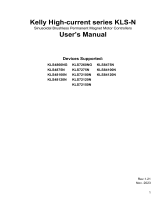
2.4.1 Requirements
WARNING
EQUIPMENT HAZARD!
Rotating shafts and electrical equipment can be hazardous.
All electrical work must conform to national and local
electrical codes. It is strongly recommended that instal-
lation, start up, and maintenance be performed only by
trained and qualified personnel. Failure to follow these
guidelines could result in death or serious injury.
CAUTION
WIRING ISOLATION!
Run input power, motor wiring and control wiring in three
separate metallic conduits or use separated shielded cable
for high frequency noise isolation. Failure to isolate power,
motor and control wiring could result in less than
optimum frequency converter and associated equipment
performance.
For your safety, comply with the following requirements.
•
Electronic controls equipment is connected to
hazardous mains voltage. Extreme care should be
taken to protect against electrical hazards when
applying power to the unit.
•
Run motor cables from multiple frequency
converters separately. Induced voltage from
output motor cables run together can charge
equipment capacitors even with the equipment
turned off and locked out.
Overload and Equipment Protection
•
An electronically activated function within the
frequency converter provides overload protec-
tionfor the motor. The overload calculates the
level of increase to activate timing for the trip
(controller output stop) function. The higher the
current draw, the quicker the trip response. The
overload provides Class 20 motor protection. See
8 Warnings and Alarms for details on the trip
function.
•
Because the motor wiring carries high frequency
current, it is important that wiring for mains,
motor power, and control are run separately. Use
metallic conduit or separated shielded wire.
Failure to isolate power, motor, and control
wiring could result in less than optimum
equipment performance.
•
All frequency converters must be provided with
short-circuit and over-current protection. Input
fusing is required to provide this protection, see
Illustration 2.6. If not factory supplied, fuses must
be provided by the installer as part of installation.
See maximum fuse ratings in
10.3 Fuse Specifi-
cations.
L1
L1
L2
L2
L3
L3
GND
91 92 93
Fuses
130BB460.10
Illustration 2.6 Frequency Converter Fuses
Wire Type and Ratings
•
All wiring must comply with local and national
regulations regarding cross-section and ambient
temperature requirements.
•
Danfoss recommends that all power connections
be made with a minimum 75 °C rated copper
wire.
•
See 10.1 Power-dependent Specifications for
recommended wire sizes.
2.4.2
Earth (Grounding) Requirements
WARNING
GROUNDING HAZARD!
For operator safety, it is important to ground the
frequency converter properly in accordance with national
and local electrical codes as well as instructions contained
within these instructions. Ground currents are higher than
3,5 mA. Failure to ground the frequency converter properly
could result in death or serious injury.
NOTE
It is the responsibility of the user or certified electrical
installer to ensure correct grounding (earthing) of the
equipment in accordance with national and local electrical
codes and standards.
•
Follow all local and national electrical codes to
ground electrical equipment properly
•
Proper protective grounding for equipment with
ground currents higher than 3,5 mA must be
established, see Leakage Current (>3,5 mA)
•
A dedicated ground wire is required for input
power, motor power and control wiring
Installation
VLT
®
AutomationDrive Operating
Instructions
MG33AM02 - VLT
®
is a registered Danfoss trademark 13
2
2





















